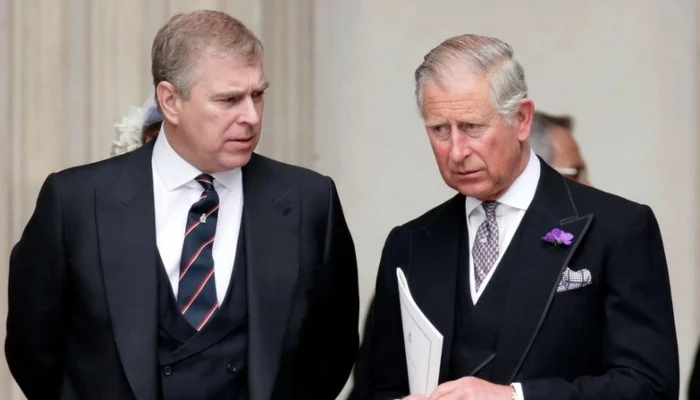The British Royal Family has long been a symbol of tradition and unity, but even behind the gilded gates of Buckingham Palace, discord can brew. Recent headlines have spotlighted a growing tension between King Charles III and his younger brother, Prince Andrew. Once considered close, the two now find themselves embroiled in what many royal watchers are calling a full-blown feud. Here’s an in-depth look at how Prince Andrew and King Charles’ Feud is escalating boiling point.
Read Also: When Will Fortnite Be Back Up? Everything You Need to Know About the Downtime
The Origins of the Feud
1. The Epstein Scandal
Prince Andrew’s association with disgraced financier Jeffrey Epstein has been a major source of embarrassment for the Royal Family. The scandal intensified following Andrew’s infamous BBC interview in 2019, which was widely criticized for its lack of remorse and accountability. In the aftermath, the late Queen Elizabeth II stripped Andrew of his royal duties. However, the fallout continued to reverberate within the family.
King Charles, known for his dedication to protecting the monarchy’s reputation, reportedly pushed for Andrew’s withdrawal from public life. This decision created a rift, with Andrew feeling marginalized and unsupported.
2. Property Disputes
Another point of contention is Andrew’s residence, the Royal Lodge at Windsor. Reports suggest that King Charles has encouraged Andrew to vacate the property as part of a broader effort to streamline royal expenditures. Andrew, however, has reportedly resisted, claiming he has invested significantly in the property and views it as his rightful home.
3. A Clash of Personalities
Beyond specific incidents, the brothers have fundamentally different approaches to their roles within the monarchy. King Charles has long advocated for a “slimmed-down” royal family, focusing resources and public attention on a smaller group of senior royals. Andrew, on the other hand, has struggled to adjust to his diminished role, reportedly seeking ways to reestablish his public image—much to Charles’ dismay.
Recent Developments
1. King Charles’ Coronation
The lead-up to King Charles’ coronation in May 2023 provided a glimpse into the strained relationship. While Andrew attended the ceremony, he was notably excluded from any prominent roles. Royal insiders noted the stark contrast between Andrew’s position and that of his elder brother, who now commands the global stage as monarch.
2. Public Appearances
Prince Andrew’s recent attempts to reenter public life have been met with mixed reactions. In some instances, King Charles has intervened to limit Andrew’s visibility, reportedly fearing that his brother’s involvement could reignite public criticism of the monarchy.
3. Family Dynamics
The rift has also strained relationships with other family members. Prince William and Prince Harry have both maintained their distance from Andrew, and even Princess Beatrice and Princess Eugenie—Andrew’s daughters—are said to be caught in the crossfire, attempting to balance loyalty to their father with their roles within the royal fold.
The Consequences of the Feud
1. Public Perception
The feud has added another layer of scrutiny to a monarchy already grappling with questions about its relevance in modern society. As King Charles seeks to define his reign, the ongoing discord risks overshadowing his efforts.
2. Family Unity
The Royal Family’s image as a cohesive unit has taken a hit. Public spats, however discreetly handled, fuel speculation and diminish the family’s ability to project solidarity.
3. Andrew’s Future
For Prince Andrew, the feud has left him increasingly isolated. Without a clear path back to public life, he faces an uncertain future, dependent on his personal fortune and what support—if any—the monarchy chooses to provide.
Possible Resolutions
1. Mediation
Some royal commentators have suggested that mediation could help mend the rift. A neutral third party might facilitate a dialogue between the brothers, allowing them to address their grievances constructively.
2. Compromise
King Charles might consider offering Andrew a smaller but dignified role within the royal framework, provided it aligns with public expectations and minimizes controversy.
3. A Clean Break
Alternatively, the monarchy could formalize Andrew’s exit from royal life entirely, providing him with a financial settlement and encouraging him to focus on private pursuits.
Conclusion
The rift between King Charles and Prince Andrew underscores the challenges of balancing personal relationships with the responsibilities of a centuries-old institution. As King Charles navigates his reign, resolving this feud will be critical to maintaining the monarchy’s integrity and relevance in the modern era. Whether through mediation, compromise, or a clean break, the outcome will undoubtedly shape the future of the Royal Family.
Read Also: When Will Fortnite Be Back Up? Everything You Need to Know About the Downtime
FAQs about Prince Andrew and King Charles’ Feud is Escalating
Q: Why are Prince Andrew and King Charles feuding?
A: The feud stems from multiple factors, including Prince Andrew’s association with Jeffrey Epstein, disputes over his royal role and residence, and differing visions for the monarchy’s future.
Q: What is the current status of Prince Andrew’s royal duties?
A: Prince Andrew was stripped of his royal duties in 2019 and has not returned to public engagements. King Charles has reportedly resisted efforts to rehabilitate Andrew’s image.
Q: How has the public reacted to the feud?
A: Public opinion has largely sided with King Charles, viewing his actions as necessary to protect the monarchy’s reputation. However, there is some sympathy for Andrew’s predicament.
Q: Can the rift be resolved?
A: While resolution is possible, it will require significant compromise from both parties. Mediation and a clear agreement on Andrew’s future role could help ease tensions.
Q: How does this feud affect the monarchy overall?
A: The feud highlights internal divisions within the Royal Family, potentially undermining the monarchy’s image as a unifying institution.



Leave a Reply